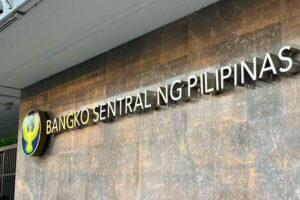YIELDS on the Bangko Sentral ng Pilipinas’ (BSP) term deposits continued to edge down on Wednesday amid strong demand and on expectations of another rate cut as inflation remains benign.
Bids for the central bank’s term deposit facility (TDF) amounted to P140.077 billion, well above the P100 billion auctioned off and the P125.644 billion in bids for the same offer volume last week. The BSP fully awarded both tenors.
Broken down, the seven-day papers fetched P56.8 billion in bids, higher than the P50 billion placed on the auction block and the P53.122 billion seen for the same volume offered a week ago.
Banks asked for rates ranging from 5.03% to 5.08%, narrower than the 5% to 5.09% logged the previous week. This caused the weighted average accepted yield to slip by 0.44 basis point (bp) to 5.059% from 5.0634% previously.
Meanwhile, tenders for the 14-day papers hit P83.277 billion, well above the P50-billion offer and the P72.522 billion in demand for the same volume auctioned off last week.
Accepted yields were from 5.06% to 5.09%, a narrower band compared with the 4.98% to 5.1125% seen a week earlier. With this, the average rate dropped by 1.19 bps to 5.0799% from 5.0918%.
The BSP has not auctioned off 28-day term deposits for nearly five years to give way to its weekly offerings of securities with the same tenor.
Both the TDF and BSP bills are used by the central bank to mop up excess liquidity in the financial system and better guide market rates towards the policy rate.
“BSP TDF average auction yields were again slightly lower week on week after still relatively benign inflation of 1.7% in September 2025, again below the BSP’s inflation target of 2%-4% for the seventh straight month,” Rizal Commercial Banking Corp. Chief Economist Michael L. Ricafort said in a Viber message.
This bolstered expectations of another 25-bp cut from the central bank at this week’s Monetary Board meeting or in December, he said.
Inflation picked up to 1.7% in September from 1.5% in August, the government reported on Tuesday. This was the fastest pace in six months or since 1.8% in March, but was within the BSP’s 1.5-2.3% forecast and below the 1.9% median estimate in a BusinessWorld poll of 12 analysts.
For the first nine months, inflation averaged 1.7%, matching the BSP’s forecast for the year and still below its 2-4% annual target.
The Monetary Board is holding its second to the last policy meeting for this year on Thursday (Oct. 9). Ten of the 16 analysts in a BusinessWorld poll expect the central bank to pause anew this week after it delivered three straight cuts, while the remaining six said it could make a fourth consecutive 25-bp reduction to help support domestic demand and boost the economy.
The central bank has lowered benchmark borrowing costs by a total of 150 bps since it kicked off its rate cut cycle in August 2024, with the policy rate now at 5%.
BSP Governor Eli M. Remolona, Jr. has left the door open to one more cut this year that could mark the end of this easing round.
Mr. Ricafort added that expectations that the Philippines would soon be included in JPMorgan Chase & Co.’s Government Bond Index for Emerging Markets (GBI-EM) series also helped drive term deposit yields lower.
The global bank last month placed Philippine bonds on “Index Watch Positive,” marking the final review stage for their inclusion.
The Philippines would have a weight of about 1% of the GBI-EM Global Diversified Index if included, according to the bank.
National Treasurer Sharon P. Almanza earlier said the government expects foreign fund inflows to rise by about one percentage point or around P100 billion if the country successfully reenters the index. — Katherine K. Chan

